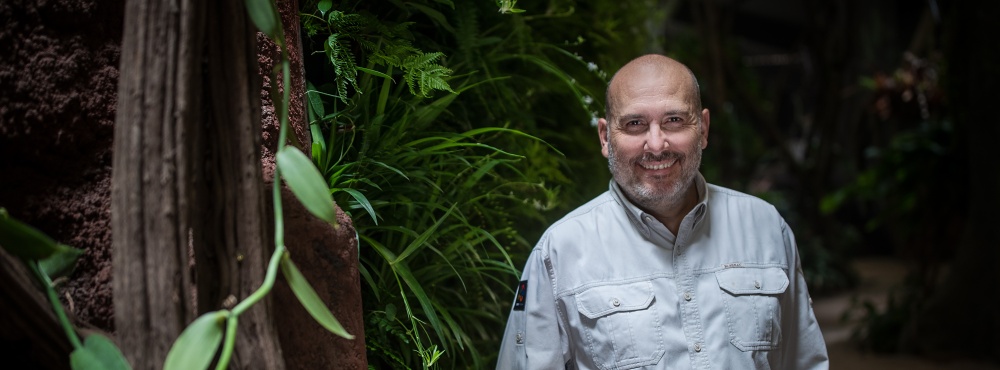Pure terror in the eyes of defenceless animals

For the first time in more than a year and a half, we visited Cameroon during the holidays. It was undoubtedly a rewarding trip, not least because at the end of it I signed a memorandum with the Cameroonian Minister of Forests and Fauna, Mr. Jules Ndoret Ndongo. This is a very significant step in the continued development of the Wandering Bus project and our other activities in this Central African country. We also met with the directors of two reserves – Dja and Ngoyla – and decided to support the work of their “ecoguards”. At the same time, however, we saw for ourselves just how much conservation has suffered in the COVID era. This is the subject of my post.
 Mbama is just under three hundred kilometres from Yaoundé. Whereas in the capital the bushmeat vendors threw stones at me, in Mbama people were willing to be photographed with the pangolins... Photo: Miroslav Bobek, Prague Zoo
Mbama is just under three hundred kilometres from Yaoundé. Whereas in the capital the bushmeat vendors threw stones at me, in Mbama people were willing to be photographed with the pangolins... Photo: Miroslav Bobek, Prague Zoo
After I arrived in Cameroon, I went to the Nkol-Ndongo market. It is not far from the centre of the Cameroonian capital Yaoundé and the reason for my visit was some information that bushmeat – the meat of wild animals – was heading there from the Dja Biosphere Reserve.
I knew that the COVID-19 pandemic had also had a negative effect on conservation and the fight against poaching in Cameroon, so I had girded my loins. But not for what awaited me. There were many animals lying on tables made of planks and even on the ground. Vervet monkeys, African brush-tailed porcupines and African palm civets. I walked up to one of the tables – it was run by a corpulent market woman in a patterned blue dress – and looked closer. Next to the porcupines was a Gaboon viper – and three pangolins. Others, perhaps still alive, were in a bag under the table. My pulse raced. Right in front of me was a complete negation of all our efforts to protect endangered species. I quickly took a few photos and then the shouting began. I beat a hasty retreat and soon rocks were whizzing through the air.

I would like to point out, that in Cameroon the pangolin is protected and cannot be hunted, let alone sold. However, I have never seen so many pangolins for sale as I did this time. Although I tried to refrain from hasty judgments, I could only interpret my horrifying experience in one way: with the pandemic, the fight against poaching has died down, and, in general, there may have been what could be described as a ‘loosening of morals’.
Two days later, on the way to Dja, we stopped off in the village of Mbama and ordered a beer at a wooden shack proudly marked “Bar Parliament”. I hadn't even managed to take my first sip when a lady appeared with a live pangolin. After a while, a couple of local sots were posing for us in the hope of a decent tip – each holding a pangolin by the tail. In a way, it was a worse experience than the Yaoundé market.

For years now, pangolins have been number one in illegally traded mammals. In Africa and Asia, they are considered to be an excellent delicacy. Moreover, however, the scales are used in traditional Chinese medicine and, despite all the bans, the illegal trade in them is enormous. An important route for this trade is through Cameroon to Nigeria and from there to Vietnam.
I have spoken to a number of people so I could critically assess my initial opinion, which I arrived at after visiting the Nkol-Ndongo market. Unfortunately, it was confirmed. Then, after reading two reports I downloaded via satellite a little later at the outpost in the depths of the Dja rainforest, this opinion was given a notional full stop. In one of these reports, it was written that a shipment of more than seven tons(!) of pangolin scales (the ninth largest in the world in the last three years) had been seized in Nigeria, and in the other, my colleagues told me that they had seen a baby pangolin for sale in a village near Dja.
Both reports were preceded by another. It was from the English biologist, Jane Goodall, who was responding to my photograph from Mbama. At the outpost I only managed to download the header. But even that spoke volumes: “Oh, Miroslav, we MUST do something. Pure terror in the eyes”.
Miroslav Bobek
|
Pangolins are consumed “locally”, and their scales are then traded illegally. Traditional Chinese medicine uses them in about 500 preparations to treat a variety of problems, such as skin diseases and hysteria. China stopped reimbursing these traditional medicines through its healthcare system two years ago and has prosecuted the trade in scales, but smuggling continues and not even the COVID-19 pandemic has stopped it, as evidenced by the list of the largest seizures of scale shipments since 2019.
Note: One tonne of scales represents about 2,500 dead pangolins. |
ZOOPRAHA.CZ
Contacts
- The Prague zoological garden
U Trojskeho zamku 120/3
171 00 Praha 7
Phone.: (+420) 296 112 230 (public relations department)
e-mail: zoopraha@zoopraha.cz
Others








